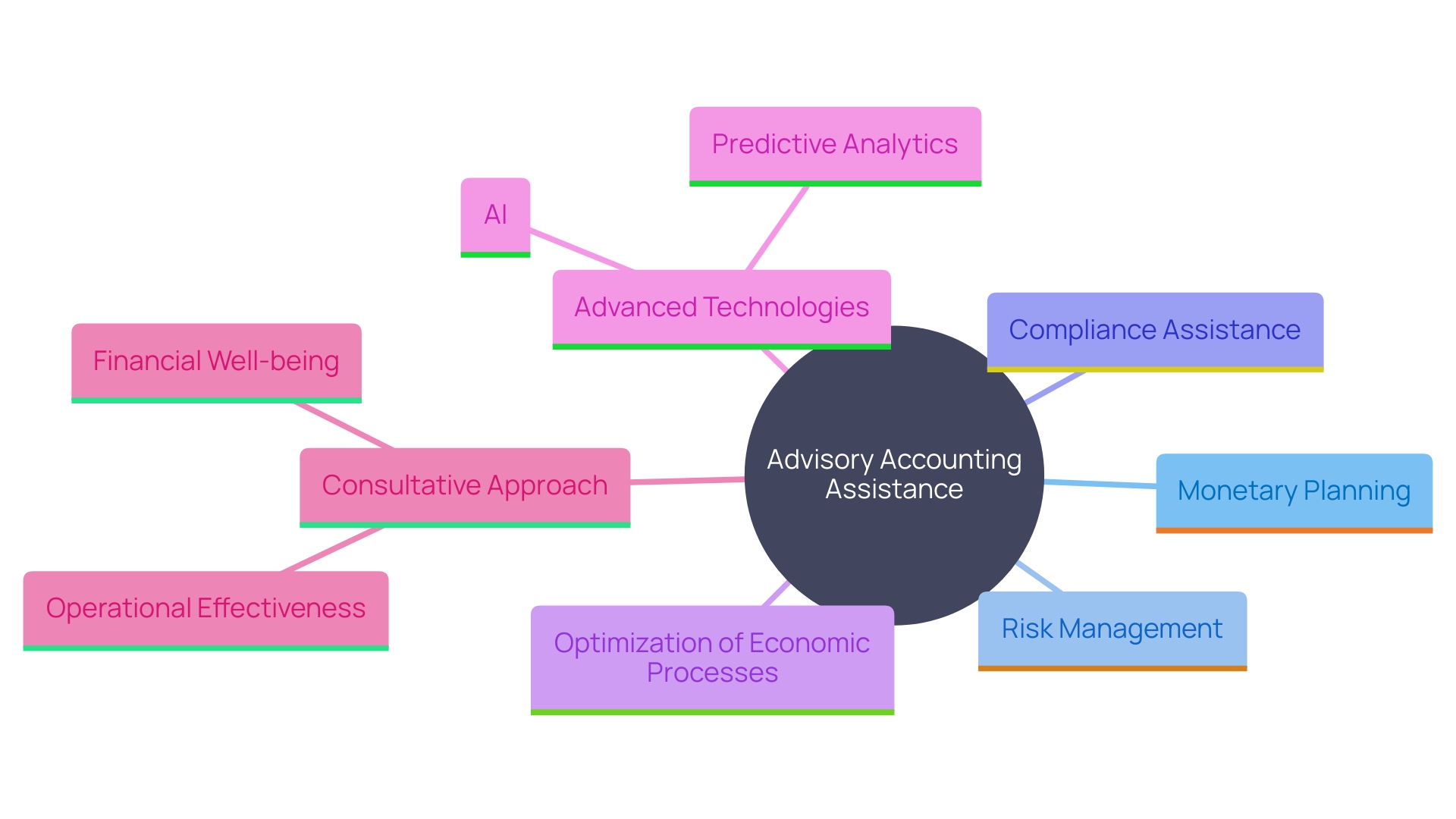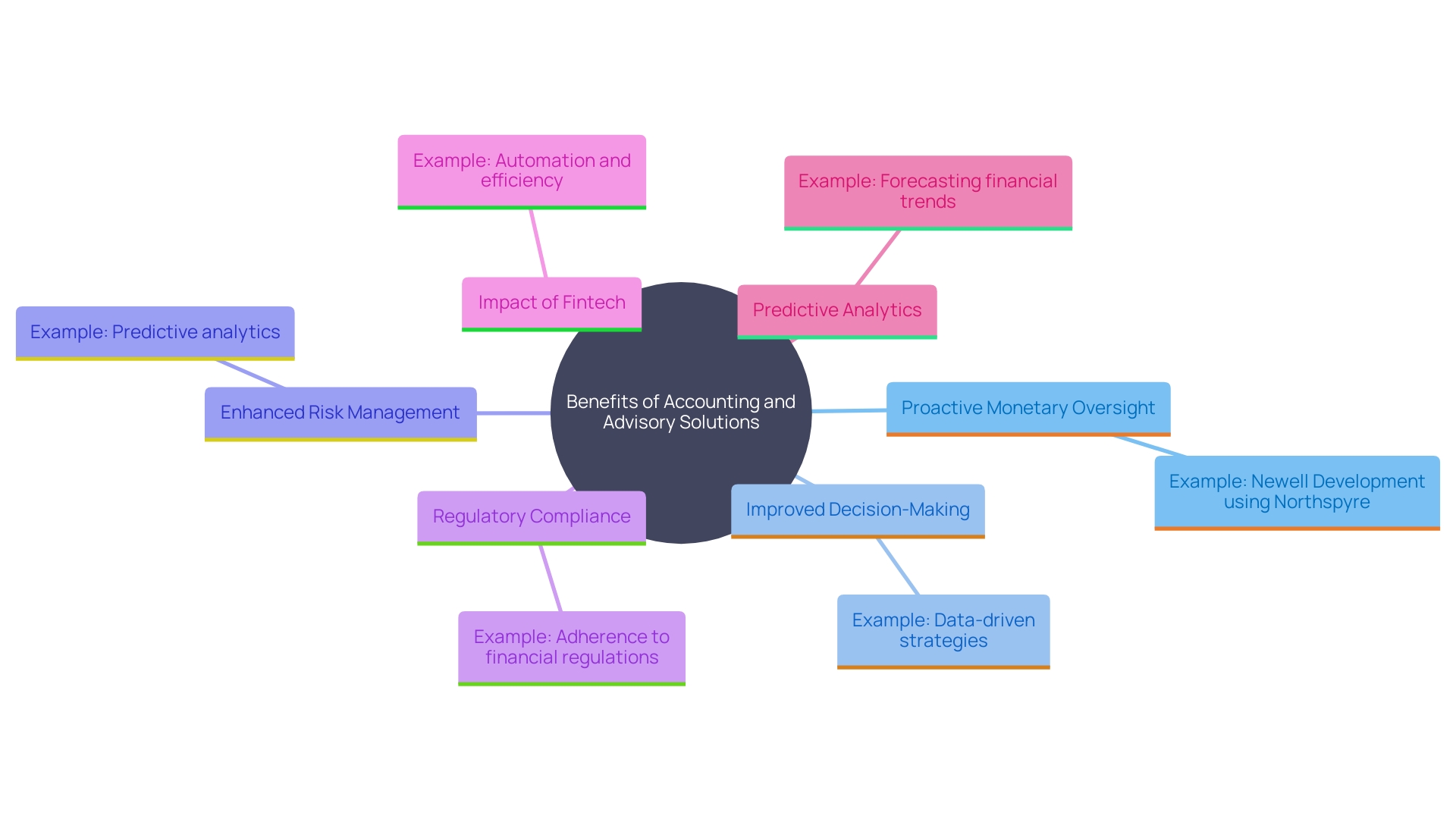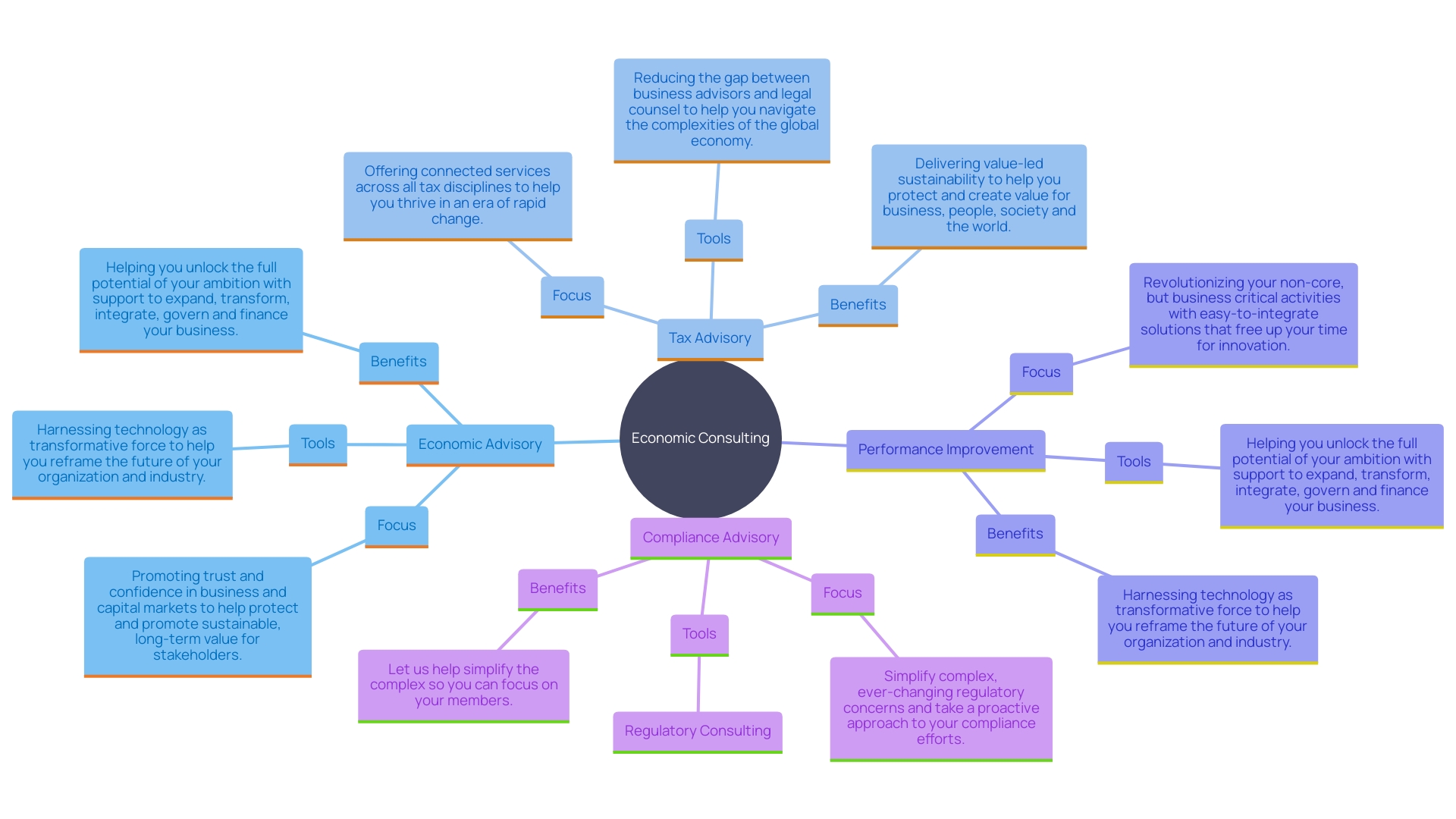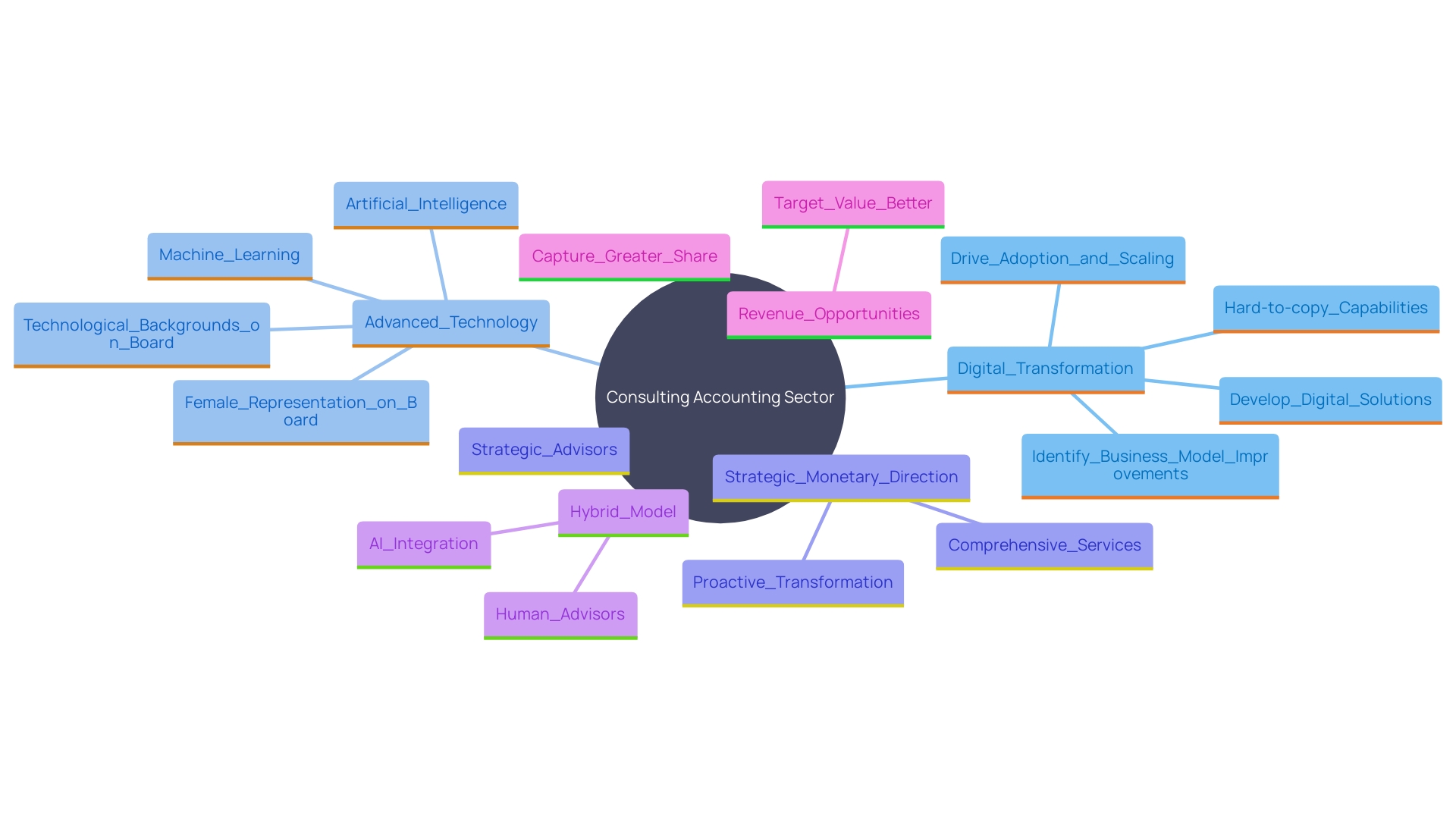Introduction
Advisory accounting services are revolutionizing the way businesses manage their financial landscapes, offering a blend of strategic insights and actionable recommendations that go beyond traditional accounting. These services encompass financial planning, risk management, compliance assistance, and optimization of financial processes, all tailored to meet each client's unique needs. By integrating advanced technologies like artificial intelligence and predictive analytics, firms can enhance their decision-making capabilities and operational efficiency.
In today's complex regulatory environment, staying compliant is more challenging than ever, with an average of 399 changes to the Tax Code per year. Financial advisory services help businesses navigate these complexities, ensuring they remain compliant and avoid potential pitfalls. Real-world examples like Crowe LLP and Cornerstone Advisors illustrate the transformative impact of combining deep industry expertise with cutting-edge technology.
As businesses strive to optimize their financial health and operational performance, advisory accounting services provide the strategic insights and tools needed to navigate the financial landscape confidently.
Definition and Scope of Advisory Accounting Services
Advisory accounting assistance provides thorough solutions aimed at helping enterprises maneuver complex monetary environments with accuracy. 'These offerings extend beyond traditional accounting to include strategic insights and actionable recommendations tailored to each client's unique needs.'. Key offerings encompass monetary planning, risk management, compliance assistance, and optimization of economic processes. By incorporating a consultative approach, these offerings empower organizations to make informed choices that improve their financial well-being and operational effectiveness.
For instance, firms like Crowe LLP leverage deep industry expertise to provide audit, tax, and consulting services, assisting enterprises in uncovering hidden opportunities and making smart decisions despite market challenges. Crowe's global network, consisting of over 200 independent firms in more than 130 countries, underscores the importance of a collaborative and consultative approach in delivering lasting value.
Moreover, the evolving regulatory landscape requires a vigilant approach to compliance. As noted by the American Bar Association, the complexity of rules and regulations has increased significantly, with an average of 399 changes to the Tax Code per year. This underscores the need for organizations to stay current with compliance requirements to avoid potential pitfalls.
The adoption of advanced technologies such as artificial intelligence (AI) and predictive analytics is also transforming the advisory landscape. A recent survey revealed that 72% of finance leaders are currently utilizing AI to enhance productivity. Predictive analytics, specifically, plays an essential role in interpreting monetary data to forecast future outcomes, enabling companies to respond effectively to complex economic conditions.
Real-world instances such as Cornerstone Advisors illustrate the influence of merging knowledge with exclusive data to provide strategic planning, performance enhancement initiatives, and merger integration solutions. This approach not only helps monetary institutions thrive but also ensures they remain agile in adapting to market changes.
In summary, consulting accounting assistance is essential for companies aiming to enhance their monetary well-being and operational effectiveness. By utilizing strategic insights, advanced technologies, and a profound comprehension of regulatory requirements, these offerings enable enterprises to maneuver through the intricacies of the financial environment with assurance.

Key Differences Between Advisory and Consulting Services
Advisory and consulting assistance, although both intended to improve organizational performance, differ greatly in their methods and emphasis. Advisory support is relationship-driven, providing ongoing strategic guidance and fostering collaboration. They offer a comprehensive structure for value creation, integrating strategy with performance metrics. One of the primary advantages of consulting support is its capability to assist organizations in systematically examining crucial value contributors, facilitating improved decision-making and sustainable development.
In contrast, consulting assistance is typically project-based, targeting specific issues with predefined solutions. Consulting frameworks play a crucial role here, offering structured methodologies to address complex organizational problems. For instance, industry frameworks analyze industry structures, key players, and competitive dynamics, while internal analysis frameworks assess a company's strengths and weaknesses. Solution design frameworks focus on creating tailored solutions to specific problems. These frameworks provide clarity and focus, ensuring that consultants deliver measurable improvements and help clients achieve their goals.
Comprehending these differences is essential for companies to determine the most appropriate solution for their specific challenges. As Phil Spring from IBM Consulting highlights, a diverse skill set and industry-specific knowledge are essential for effective consulting, particularly in areas like sustainability management. This comprehensive approach ensures that organizations not only address immediate issues but also build a foundation for sustained success.
Benefits of Offering Advisory Accounting Services
Establishing thorough accounting and advisory solutions reveals considerable benefits for companies. These offerings facilitate proactive monetary oversight by utilizing technology and data analysis, enabling organizations to foresee challenges and seize opportunities effectively. Improved decision-making capabilities, enhanced risk management, and stringent regulatory compliance are just a few of the benefits.
For instance, Newell Development experienced a transformation using Northspyre, a platform that consolidates project budgets, schedules, and scopes into a single, global view. This integration led to streamlined decision-making and more efficient project outcomes. As Theresa Leslie, Director of Finance and Administration at Newell, noted, the system's comprehensive overview ensures all stakeholders work with the most current information.
Furthermore, accounting assistance is crucial in delivering valuable insights into profitability and liquidity ratios, helping companies in monitoring financial metrics to assess performance. These insights are instrumental in making informed decisions, ultimately driving increased profitability and operational efficiency. By analyzing these metrics, business leaders can gain a clearer picture of their organization's health and take steps to ensure future success.
The rise of fintech and predictive analytics further enhances the utility of accounting services. These technologies provide advanced economic insights and streamline operations, promoting sustainable growth. 'Predictive analytics, specifically, assists organizations in addressing intricate issues and enhancing performance by anticipating future results based on monetary information.'.
In essence, strong accounting and economic guidance foster a more powerful market position by promoting trust and confidence among stakeholders and enabling enterprises to navigate the complexities of the global economy efficiently.

Types of Advisory Accounting Services
Thorough bookkeeping and economic consulting are vital for companies and stakeholders to manage the intricacies of monetary oversight and attain lasting development. 'These services can be categorized into several key areas: monetary advisory, tax advisory, performance improvement, and compliance advisory.'.
Economic Advisory: This area focuses on strategic planning and investment management, guiding organizations through crucial monetary decisions. By employing instruments like balance sheets and income statements, advisors offer a glimpse of a company's economic condition and profitability. The insights gained from these tools enable organizations to make informed investment decisions, optimize resource allocation, and enhance overall financial stability.
Tax Advisory: Navigating the labyrinth of tax regulations can be daunting for any organization. Tax advisory services help organizations optimize their tax positions and comply with ever-changing tax laws. Advisors analyze financial information to identify tax-saving opportunities, ensuring that enterprises remain compliant while maximizing their financial efficiency.
Performance Improvement: Operational efficiency is a cornerstone of organizational success. Performance enhancement offerings involve a thorough examination of organizational processes, identifying areas for improvement. For instance, operational review reports provide a comprehensive review of departmental performance, assisting in resource allocation and scenario analysis. These insights drive improvements in operational efficiency, ultimately leading to increased profitability. 'As stated in a recent report, performance enhancement projects experienced a 56% rise, emphasizing the increasing need for these offerings.'.
Compliance Advisory: Ensuring adherence to legal and regulatory requirements is critical for any organization. Compliance consulting assists companies in keeping up with the most recent regulations, lowering the chances of legal problems and fines. By maintaining robust compliance practices, organizations can focus on their core operations without the distraction of regulatory concerns.
Integrating these advisory services into your organizational strategy can result in considerable enhancements in economic performance, operational efficiency, and regulatory compliance. With expert guidance, companies can maneuver through the economic environment with assurance and attain their long-term goals.

Skills Required for Advisory Accounting Services
Advisory accounting professionals must cultivate a multifaceted skill set to proficiently support their clients. Essential skills encompass robust analytical abilities for dissecting complex problems, identifying root causes, and formulating effective strategies. As W. Edwards Deming aptly stated, "In God we trust, all others bring data." This highlights the necessity for data-driven insights in strategic recommendations. The ability to navigate through quantitative and qualitative data ensures that consultants can extract pertinent information to inform their strategies and measure the impact of their interventions.
Financial acumen and a deep understanding of business operations are critical for providing meaningful advice. Effective communication is essential for conveying complex economic concepts and collaborating with clients. Additionally, expertise in pertinent software applications and a complete grasp of regulatory structures are essential for providing detailed guidance.
In the ever-evolving consulting landscape, adaptability and flexibility are paramount. Consultants must be prepared to pivot their strategies in response to shifting dynamics within client organizations or broader societal changes. This nimbleness ensures that the solutions proposed are not only innovative and feasible but also lead to sustainable and meaningful change within organizations.
Revenue Potential and Market Trends in Advisory Accounting Services
The consulting accounting sector is experiencing a significant change, driven by the increasing demand for strategic monetary direction. Businesses are increasingly valuing expert insights to navigate economic uncertainties. Key trends such as digital transformation and the integration of advanced technology in financial processes are reshaping delivery models. This evolving landscape offers substantial revenue opportunities for firms that adopt innovative consulting solutions.
A recent survey by Franklin Templeton’s Industry Advisory Services underscores this shift, revealing that leading organizations are embracing digital tools to enhance their advisory services. North America, specifically, is anticipated to lead the analytics market due to the swift uptake of Business Intelligence (BI) tools and technological progress. These trends are further supported by the preference for a hybrid model of human advisors augmented by generative AI, as highlighted in a survey by Intuit.
Case studies from firms like Aria Systems illustrate the tangible benefits of expert monetary guidance in managing hyper-growth. The team’s supportive, professional approach has been instrumental in steering their business planning, execution, and review processes. Such real-world examples highlight how responsive and proactive financial advisory can drive organizational growth and stability, especially in dynamic markets.

Conclusion
Advisory accounting services are increasingly vital for businesses aiming to enhance their financial health and operational performance. By extending beyond traditional accounting, these services provide strategic insights and actionable recommendations tailored to the unique needs of each organization. The integration of advanced technologies, such as AI and predictive analytics, further amplifies the ability to make informed decisions and optimize financial processes.
The distinction between advisory and consulting services is crucial for organizations seeking the right support. Advisory services foster long-term relationships and ongoing guidance, while consulting services focus on specific, project-based solutions. Understanding this difference enables businesses to choose the most appropriate service for their challenges, ensuring effective strategies for sustained success.
Implementing comprehensive advisory services unlocks significant advantages, including improved decision-making, enhanced risk management, and greater compliance with regulatory requirements. As demonstrated by real-world examples, such as Newell Development and Crowe LLP, leveraging technology and expert insights can streamline operations and drive profitability.
In a rapidly evolving market, the demand for advisory accounting services continues to grow, driven by the need for strategic financial guidance. Firms that embrace digital transformation and innovative solutions will not only enhance their service delivery but also position themselves for substantial revenue opportunities. By incorporating a multifaceted skill set and staying adaptable in a changing landscape, advisory accounting professionals can empower businesses to navigate complexities with confidence.




